Types of Fat Structures | Fat Composition of Oils and Solid Fats
The Controversy over Coconut Oil | Olive Oil Nutritional Facts
Types of Fat Structures
| All edible oils and solid fats are 100% fat, but the components that make up the fat structure of a particular edible fat are important in determining whether or not it is considered healthy. While some edible fats from plant sources, such as olive oil and flax seed oil, are considered very healthy, they are all high in calories. All plant oils have about 120 calories per tablespoon so they should be consumed in moderation as part of a balanced diet. |
|
Unsaturated Fats |
|
Monounsaturated Fat
Most animal and vegetable fats contain monounsaturated fat, but in varying quantities. It is usually in liquid form at room temperature, but it may begin to solidify when it is chilled. Monounsaturated fat is the most desirable type of fat in the diet because it helps to decrease the LDL (bad) cholesterol in the blood and helps to increase the HDL (good) cholesterol. Good sources of monounsaturated fat are macadamia nut oil, olive oil, canola oil, peanut oil, and most nuts. Macadamia nut oil has the highest percentage (about 83%) of monounsaturated fat of any edible oil, but it is expensive and it is not as commonly used in cooking as other oils. Olive oil has the highest percentage (about 77%) of monounsaturated fat among commonly used oils. |
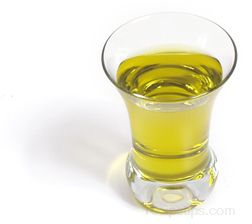
Olive Oil |
|
Polyunsaturated Fat
The main sources of polyunsaturated fats are seeds, nuts, grains, and vegetables. Polyunsaturated fat is usually in a liquid state at room temperature and also when chilled. It lowers the overall cholesterol level, but it also reduces HDL or good cholesterol. Recommended daily allowances of polyunsaturated fats should be part of a balanced diet, but some tests have shown that high consumption may actually be damaging to the digestion and nervous systems, so moderation is the key for a balanced and healthy diet. Safflower oil has the highest percentage of polyunsaturated fat of any edible oil (about 77%).
Omega-3 fatty acid is a type of polyunsaturated fat that is especially healthy. Omega-3 fatty acids help to reduce the risk of heart disease, lower blood pressure, guard against plaque buildup in the arteries, and aid in brain development. It is found in some plant oils and in the tissues of all sea creatures. Among the plant oils rich in omega-3 fatty acids are flaxseed, canola, and soybean oil. Fish that are particularly high in omega-3 are sardines, herring, tuna, and salmon. |
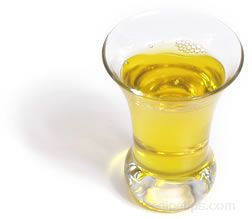
Safflower Oil - highest content of polyunsaturated fat of any edible oil
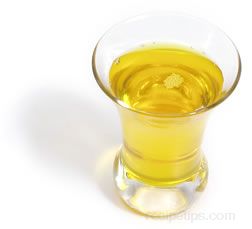
Flaxseed Oil - rich in omega-3 fatty acid |
|
Saturated Fats |
|
Saturated Fat
Animal fats, butter, cream, and whole milk are the primary sources of saturated fat, which is the least healthy type of fat. Saturated fat raises the level of LDL (bad) cholesterol, which causes numerous health problems if consumed in large quantities. Most saturated fats are solid at room temperature. |
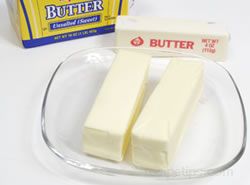
Butter |
|
Trans-fatty Acid
Trans-fatty acid, also known as trans-fat, is formed when hydrogen is added to vegetable oil in order to change the liquid oil into a solid at room temperature. This process is known as hydrogenation, which also transforms the unsaturated fats of the liquid oils into saturated fat. In some cases, trans-fat may be worse in terms of health related issues than naturally occurring saturated fats. Like saturated fat, trans-fat may raise blood cholesterol levels and increase the risk of heart related diseases. Many shortenings, margarines, and commercially baked goods are high in trans-fatty acids.
Besides the ability to transform a liquid fat into a solid one, the primary advantage of hydrogenation is that hydrogenated fats are less likely to turn rancid, which is very beneficial to the commercial food industry in creating foods with a longer shelf life. As with any type of food containing saturated fat, foods containing hydrogenated or partially hydrogenated fat should be enjoyed in moderation in order to maintain a balanced and healthy diet. |
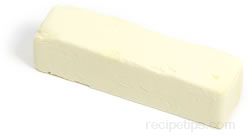
Margarine
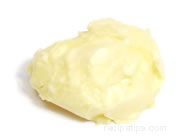
Shortening |
Fat Composition of Oils and Solid Fats
|
Fat Composition of Various Oils and Solid Fats
Percentages in bold indicate that a particular fat
component (monounsaturated, polyunsaturated, or saturated)
is either the highest or lowest among all edible oils and solid fats.
All percentages have been rounded to the nearest whole number. |
| Type of Fat |
Monounsaturated |
Polyunsaturated |
Saturated |
| Almond Oil |
73% |
19% |
8% |
| Avocado Oil |
70% |
10% |
20% |
| Butter |
30% |
4% |
66% |
| Canola Oil |
62% |
32% |
6% |
| Cocoa Butter |
35% |
3% |
62% |
| Coconut Oil |
6% - Lowest |
2% - Lowest (tie) |
92% - Highest |
| Corn Oil |
25% |
62% |
13% |
| Cottonseed Oil |
26% |
50% |
24% |
| Grape Seed Oil |
17% |
71% |
12% |
| Hazelnut Oil |
76% |
14% |
10% |
| Lard |
47% |
12% |
41% |
| Macadamia Nut Oil |
83% - Highest |
3% |
14% |
| Margarine (Hard) |
14% |
16% |
80% |
| Margarine (Soft) |
47% |
33% |
20% |
| Mustard Oil |
76% |
23% |
1% - Lowest |
| Olive Oil |
77% |
9% |
14% |
| Palm Oil |
38% |
10% |
52% |
| Palm Kernel Oil |
12% |
2% - Lowest (tie) |
86% |
| Peanut Oil |
49% |
33% |
18% |
| Rice Bran Oil |
47% |
33% |
20% |
| Safflower Oil |
13% |
77% - Highest |
10% |
| Sesame Oil |
40% |
46% |
14% |
| Soybean Oil |
24% |
61% |
15% |
| Sunflower Oil |
20% |
69% |
11% |
| Walnut Oil |
19% |
67% |
14% |
| Wheat Germ Oil |
30% |
50% |
20% |
The Controversy over Coconut Oil
|
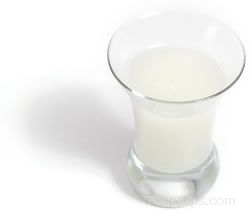 Coconut oil contains a high level of saturated fat (92%). It is generally agreed among nutritionists and health professionals that foods with high levels of saturated fats should be avoided, but this may not be true with coconut oil. There are several studies that have indicated that since the saturated fat in coconut oil is of a plant source, it metabolizes in the body similar to an unsaturated fat and as a result, LDL (bad) cholesterol will not increase. Coconut oil contains a high level of saturated fat (92%). It is generally agreed among nutritionists and health professionals that foods with high levels of saturated fats should be avoided, but this may not be true with coconut oil. There are several studies that have indicated that since the saturated fat in coconut oil is of a plant source, it metabolizes in the body similar to an unsaturated fat and as a result, LDL (bad) cholesterol will not increase.
It has been suggested that coconut oil is much like a carbohydrate: it digests rapidly and it is used for immediate energy rather than being stored as fat. As a result, a greater quantity of coconut oil can be consumed before it is stored as fat. Some studies have indicated that adding coconut oil to the diet may contribute to weight loss because it satisfies hunger and decreases the appetite. People who have problems in receiving adequate nourishment, such as AIDS patients, have benefited from the addition of coconut oil to their diets. There is also evidence that because coconut oil is digested much like a carbohydrate, it may improve athletic performance and endurance.
Despite all of the studies and individual testimonials, there are an equal number of health professionals and organizations that disagree with the claims of the positive effects associated with coconut oil. In promoting healthy food choices, both the USDA and the FDA recommend a diet low in saturated fat and the American Heart Association is skeptical concerning the studies indicating the health benefits of coconut oil. It is evident that more scientific studies will be necessary before the claimed health benefits of coconut oil can be proven. |
Olive Oil Nutritional Facts
Composition | Health Benefits | Mediterranean Diet
|
 Olive oil is an excellent alternative to butter or margarine for use in food preparation or for use as a condiment. It enhances the taste of many foods and because olive oil is so flavorful, less is required to add its distinctive flavor to food. This reduces the calories and the total fat content of food prepared or served with olive oil compared to food prepared with other less flavorful oils. Olive oil is an excellent alternative to butter or margarine for use in food preparation or for use as a condiment. It enhances the taste of many foods and because olive oil is so flavorful, less is required to add its distinctive flavor to food. This reduces the calories and the total fat content of food prepared or served with olive oil compared to food prepared with other less flavorful oils.
Although olive oil has proven health benefits, it is still 100% fat and most doctors and nutritionists believe that people should limit their usage of fat. Like all other plant oils, olive oil has about 120 calories per tablespoon, so in spite of its favorable nutritional profile, consuming it in large quantities may contribute to weight gain. Because it is so flavorful, a little goes a long way when used as a cooking oil, a salad dressing, or condiment.
It is worth noting that when olive oil is used for cooking, its health and nutritional benefits do not change as the oil is heated. The flavor of the oil will decrease with heat, but the nutritional aspects remain the same.
|
|
Composition
Olive oil contains a high percentage of monounsaturated fat, which is the most desirable of the major fat components in terms of nutrition and health. Monounsaturated fat helps to decrease the LDL (bad) cholesterol in the blood and helps to increase the HDL (good) cholesterol. Because olive oil is vegetable based, it contains no cholesterol.
Macadamia nut oil has the highest percentage (about 83%) of monounsaturated fat of any edible oil, but it is expensive and it is not as commonly used in cooking as other oils. Olive oil has the highest percentage (about 77%) of monounsaturated fat among commonly used oils. The table below shows how the fat composition of olive oil compares with several of the other most widely used cooking oils. |
|
Olive Oil
|
77%
Monounsaturated |
9%
Polyunsaturated |
14%
Saturated |
| Canola Oil |
62% |
32% |
6% |
| Corn Oil |
25% |
62% |
13% |
| Peanut Oil |
49% |
33% |
18% |
| Safflower Oil |
13% |
77% |
10% |
| Soybean Oil |
24% |
61% |
15% |
| Sunflower Oil |
20% |
69% |
11% |
|
Health Benefits
The following health benefits have been linked to consumption of olive oil:
|
|
Heart and Blood
- Olive oil has been determined to be beneficial in lowering the risk of heart disease.
- The monounsaturated fat in olive oil helps to reduce the level of LDL (bad) cholesterol in the blood.
- Including olive oil as part of a balanced diet, may help to reduce blood pressure.
- A decrease in blood sugar levels is another benefit linked to the moderate use of olive oil.
|
|
Digestion
- Olive oil helps with digestion and the absorption of nutrients, which tends to slow as people age.
- Absorption of several vitamins including A, D, E, and K is be increased as a result of olive oil consumption.
- Olive oil helps to stimulate the gall bladder to secrete bile, which helps to prevent gallstones.
|
|
Skin and Hair
- Olive oil is also beneficial for the skin and hair. Overly dry skin or sun damaged skin can be soothed with the application of olive oil.
- Some people apply olive oil to the skin to prevent wrinkles, although there is no scientific evidence to support this.
- Olive oil promotes shiny and full-bodied hair and a healthy scalp.
|
|
Other Benefits
- Olive oil promotes cellular growth, speeds healing, and helps the metabolism.
- It helps to maintain healthy bones and prevents calcium loss.
- Olive oil is good source of the antioxidant, vitamin E. It contains 1.6 mg. of vitamin E per tablespoon, which is 8% of the recommended daily allowance.
- The natural antioxidants in olive oil may help to maintain mental faculties for a longer period.
- Some scientific studies have indicated that olive oil may reduce some of the effects of aging.
|
|
The Mediterranean Diet
 The Mediterranean diet is based on the consumption of fruits and vegetables, grains, beans, nuts, cheese, fish, poultry, and olive oil. Red meats, sweets, and highly refined, processed foods are seldom consumed. Some of the lowest rates of heart disease in the world occur in Mediterranean countries, even though the diet contains as much fat as the U.S. diet. Most of the fat, however, is in the form of heart-healthy monounsaturated fat found in olive oil and in most nuts and omega-3 fatty acids found in some fish and grains. In general, the diet places emphasis on foods from plant sources and on foods that are not highly processed. The American Heart Association has found that a diet rich in these foods may help to prevent cardiovascular disease. The Mediterranean diet is based on the consumption of fruits and vegetables, grains, beans, nuts, cheese, fish, poultry, and olive oil. Red meats, sweets, and highly refined, processed foods are seldom consumed. Some of the lowest rates of heart disease in the world occur in Mediterranean countries, even though the diet contains as much fat as the U.S. diet. Most of the fat, however, is in the form of heart-healthy monounsaturated fat found in olive oil and in most nuts and omega-3 fatty acids found in some fish and grains. In general, the diet places emphasis on foods from plant sources and on foods that are not highly processed. The American Heart Association has found that a diet rich in these foods may help to prevent cardiovascular disease.
|
|
Mediterranean Diet Pyramid
The Mediterranean diet pyramid is based on the traditional diets of people in Greece, Crete, and southern Italy in the early 1960's. During that time, the incidence of chronic disease in the region was among the lowest in the world and the life expectancy was among the highest in spite of the limited medical resources that were available at the time. Current scientific research is proving what has been suspected for many years - that the Mediterranean diet, in conjunction with daily physical activity, is synonymous with good health.
Although the Mediterranean diet features a greater emphasis on foods obtained from plant sources, the total fat intake is about the same as the traditional USDA food guide pyramid. This is due to the high consumption of olive oil, however most of the fat in olive oil is in the form of monounsaturated fat, which has proven health benefits.
It is also interesting to note that moderate wine consumption at mealtime is recommended for adults as part of a healthy diet. Scientific studies have suggested that one or two small glasses of wine (especially red wine) per day may help reduce the risk of cardiovascular problems because of the antioxidants contained in the wine. However, overindulgence will have the opposite effect and may lead to other serious health problems.
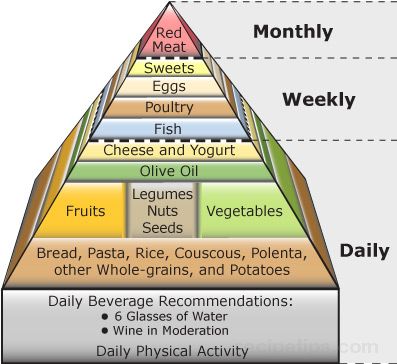
|
|
USDA Food Guide Pyramid
The USDA food guide pyramid provides an outline of the types of foods that should be consumed daily for proper nutrition. Foods should be selected that are low in saturated fat and calories in order to maintain a healthy weight while providing the required nutrients necessary for overall health.

| |







 Coconut oil contains a high level of saturated fat (92%). It is generally agreed among nutritionists and health professionals that foods with high levels of saturated fats should be avoided, but this may not be true with coconut oil. There are several studies that have indicated that since the saturated fat in coconut oil is of a plant source, it metabolizes in the body similar to an unsaturated fat and as a result, LDL (bad) cholesterol will not increase.
Coconut oil contains a high level of saturated fat (92%). It is generally agreed among nutritionists and health professionals that foods with high levels of saturated fats should be avoided, but this may not be true with coconut oil. There are several studies that have indicated that since the saturated fat in coconut oil is of a plant source, it metabolizes in the body similar to an unsaturated fat and as a result, LDL (bad) cholesterol will not increase.

